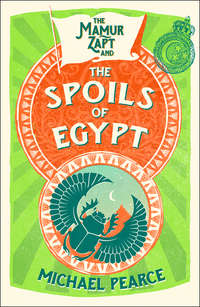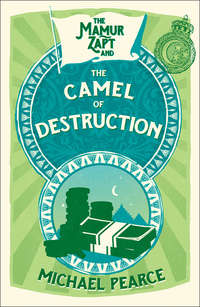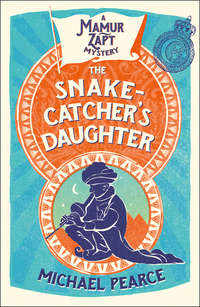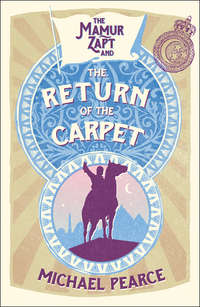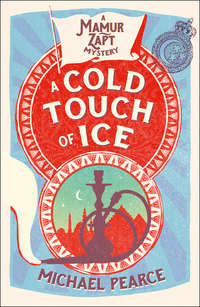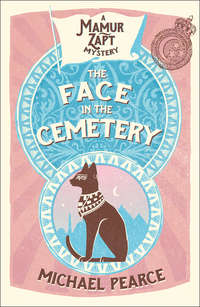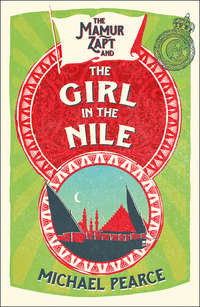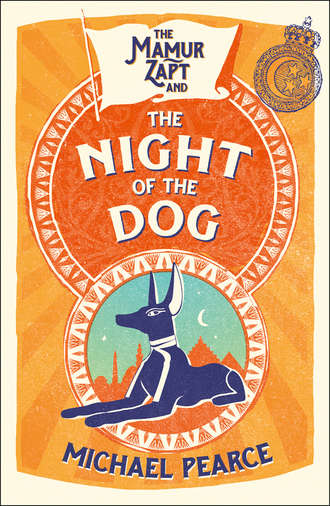
Полная версия
The Mamur Zapt and the Night of the Dog
‘The man who was standing near him, the one he bumped into or might have bumped into, was he another Zikr?’
‘Oh no. He was one of—the audience, I suppose I should say, one of the onlookers, anyway. He had sort of strayed into the ring, been drawn in, I suppose, like so many others. There were lots of them, you know, ordinary people. They pressed forward during the dancing and then they began to join in. It was very infectious. I felt quite like joining in myself. Only I thought Captain Owen would not approve of me.’
She gave Owen a look which he considered afterwards he could only describe as arch.
Mahmoud, however, was concentrating.
‘This particular onlooker, the one the Zikr nearly bumped into, was he joining in?’
‘No. He was just standing there. That is why I noticed him. I thought he was, well, you know, a bit dazed or something, bowled over by it all. I was afraid he would get in the way. And then, when the Zikr stumbled, I thought he had got in the way.’
‘Could you describe him for us, Miss Postlethwaite?’ Mahmoud asked. ‘What was he wearing, for instance?’
‘Oh, ordinary clothes.’
‘Ordinary Western clothes or ordinary Egyptian clothes?’
‘How silly I am. Of course. Ordinary Egyptian clothes. A long gown. A—galabeah, is it?’
‘You’re picking up our language well, Miss Postle-thwaite,’ said Mahmoud encouragingly. ‘Galabeah is quite right. A blue one?’
‘No. Darker than that. Grey? Black?’
‘Are you sure about that, Miss Postlethwaite?’ Owen interposed.
‘Well, not absolutely. It was dark by then and hard to see in the light. It was just that in comparison with the others his seemed dark.’
‘Did you see what kind of turban he was wearing?’
‘I am afraid not. I’m sorry. One turban is much like another to me. Darkish, anyway. Like his gown.’
Owen exchanged surreptitious glances with Mahmoud. It was early yet but he was already beginning to have a sinking feeling.
‘Anything else, Miss Postlethwaite?’ asked Mahmoud.
‘Not really. I saw him only fleetingly.’
‘How old was he?’
‘Thirty, forty—’
‘You saw his face?’
‘I must have,’ said Jane, concentrating. After a moment or two she shook her head. ‘I don’t remember it at all clearly, I’m afraid.’
‘Hands?’
‘Hands?’ said Jane, startled.
‘Sometimes they are distinctive.’
‘Yes,’ said Jane, looking at him with interest. ‘Yes, they are. Well, I did see his hands, but there was nothing distinctive about them. It was just—’
She broke off and thought for a moment. ‘I don’t remember his hands,’ she said at last, ‘but I do remember hers.’
‘Hers?’
‘The woman’s.’
‘What woman’s?’
‘Don’t you know?’ said Jane, surprised. ‘Oh, I see, you’re testing me. The woman he was with.’
Mahmoud recovered first.
‘Tell us about this woman, please, Miss Postlethwaite,’ he asked.
‘Right,’ said Jane obediently. ‘Well, we were in a sort of enclosure, you know, masked off by ropes. During the dancing this woman came right up beside me, outside the enclosure—I was at the very end of the row, next to the rope, there was a carpet hung over it too, which made it into a sort of wall—and put her hand on the rope just in front of me. That’s why I saw it in the first place. But then, of course, I noticed it. She had such lovely hand painting. Lots of Egyptian women do, don’t they?’
‘Yes,’ said Mahmoud, ‘although it’s going out now, or so my mother says.’
‘Does she herself hand-paint?’ asked Jane.
‘No!’ said Mahmoud, immensely amused at the thought of his rather Westernized mother engaging in the traditional Egyptian arts. ‘It’s not confined to the poorer classes but it’s certainly most common there. You find it generally where the old customs are strongest.’
‘Such beautiful patterns!’ said Jane enthusiastically
‘In general?’ asked Mahmoud. ‘Or just in the case of the woman you saw beside the enclosure?’
‘Both!’ said Jane. ‘But I noticed the woman because I thought her patterns were especially lovely. She didn’t paint the whole palm, you know, not like they usually do, she just sort of sketched it in and then echoed it around the knuckles and nails. But what really caught my eye were her wrists. She had a most intricate pattern around them, all in delicate blue, not the usual blue of the poorer women, and not that rich orangey-red you often see. It ran round her wrist in a series of hooks and crosses all linked together, like a sort of painted bracelet.’
‘Crosses?’ said Owen. He was quite sure about the sinking feeling now.
‘Yes. Small square ones. That’s a traditional pattern, too, isn’t it?’
‘Yes,’ said Owen, ‘especially among some people.’
Mahmoud was pleased.
‘You are a most excellent observer, Miss Postlethwaite,’ he told her warmly.
‘I could hardly help noticing, could I?’ said Jane, half apologetically. ‘It was right before my eyes.’
‘Yes, but not everyone notices what’s right in front of their eyes.’
Owen kept his own eyes looking firmly out of the window.
‘Can you tell us anything else about this woman, Miss Postlethwaite?’ asked Mahmoud.
‘Not really,’ said Jane. ‘She was dressed from head to foot in one of those black gowns. I suppose I wouldn’t even have seen her hand if she had not put it on the rope. The only thing—’ She hesitated.
‘Yes?’ prompted Mahmoud.
‘The only thing I remember,’ she said, ‘was the smell.’
‘What sort of smell?’
‘Scent.’
‘She had a lot of perfume on?’
‘No. Not exactly. Not in that way.’
‘Distinctive? A distinctive perfume? Heavy, perhaps?’
Again Jane shook her head.
‘Not really. I don’t quite know what it was. Perhaps it was where it was that surprised me.’
‘Where it was?’
‘Yes. It wasn’t on her wrist or on her throat, not where you’d usually put it. In fact, it wasn’t on her at all. It was on her sleeve. And—not just on one part. All over her sleeve.’
‘Ah.’
‘That means something to you, does it?’ she said, looking at Mahmoud.
‘It might. Tell me—can you remember—was it one perfume or different ones?’
‘How clever of you. Different ones. She had been trying them on, you think? But on her sleeve?’
‘You’ve been very helpful Miss Postlethwaite,’ said Mahmoud. ‘Truly very helpful.’
‘Is it important?’ asked Jane. ‘I don’t quite see—’
‘It might be,’ said Mahmoud. ‘Now, can we just go back a little. At a certain point you became aware of this lady placing her hand on the rope. When exactly was that?’
‘I can’t say exactly. Towards the end of the dancing? Yes, it must have been towards the end because at the start, you know, the woman were at the back, it was the men who were at the front, and then as the dancing went on everyone became sort of drawn in and some of the women came forward, though of course they didn’t actually join in the dancing or anything like that, except to cry out and encourage the dancers.’
‘And that was when this woman came forward?’
‘Yes.’
‘With the man?’
‘Oh no. He was already there. So far forward that he was almost part of the dance.’
‘When did they meet up, then?’ asked Mahmoud. ‘You spoke of her as being with him.’
‘Afterwards. They left together.’
‘When the Zikr collapsed?’
‘Yes. He stepped back into the crowd. I think he realized that it was partly his fault, that he had bumped into the Zikr. I mean, he shouldn’t really have been there, should he? He was just getting in the way. He stepped back right in front of me, I couldn’t see the dancers for a moment or two, that’s how I remember, but then the crowd let him in and he slipped back along the rope.’
‘Where the woman was waiting?’
‘Yes. It seemed like that, because as soon as he got to her she turned and left with him. I was aware of it because she had been partly blocking my vision and when she left I could see the little boys bringing fire.’
Deep in the recess of the hotel a gong sounded and Miss Postlethwaite stirred slightly. A splendid suffragi in a red sash appeared at the door. Mahmoud rose to his feet and put out his hand.
‘Thank you very much, Miss Postlethwaite,’ he said. ‘You have been an immense help.’
‘I have? Oh, I am so pleased.’
‘You are an excellent observer.’
‘I just notice what I see.’
‘Not everyone does.’
Mahmoud could not forbear a glance in Owen’s direction.
‘Oh, of course,’ said Jane Postlethwaite, catching the glance and misinterpreting it. ‘You will already know all this. Captain Owen will have told you.’
‘Not quite all, Miss Postlethwaite,’ said Mahmoud, ‘not quite all.’
CHAPTER 4
It was safe to assume in Cairo that nothing you did would go unobserved. No matter how private the occasion or how secret the place, someone would be bound to be watching. So it was with the matter of the dog. It was not long before Georgiades, Owen’s agent, had found not one but two witnesses. Not only that; the accounts of the witnesses—and this was definitely unusual in Cairo—roughly corresponded.
The first was an old man, an Arab, who lived in the cemetery. Georgiades showed Owen where he lived. It was in a space between two gravestones beneath the rubble of a collapsed tomb. Peering down between the stones Owen saw a hole about five feet deep and four feet square. It was in there that the old man lived. Apart from a worn rush mat he had no provisions, but the hole at least kept him cool during the hot weather and sheltered him from the wind during the khamsin. He had a short, torn galabeah and thin, birdlike legs. His face was scruffy with grey stubble and his eyes, as they looked up towards the light, were so red with disease that the first question was whether he could have seen what he claimed he had.
During the night, he said, men had come.
Men? Yes, he was adamant. Four of five of them, carrying something. They had stopped some way from the tomb. He could show them. No, he had not gone himself to the place, he had been frightened, thinking that perhaps they were carrying a corpse. The Copts would have been angry with him if they had seen him. They would think he had been observing their secret rites. So he had kept well away from them, hidden among the rubble, but he had definitely seen them, a small group of men in the light of the moon.
Had they gone to the tomb? Did he know which tomb? Yes, he did. It was the Tomb of Andrus. He knew Andrus because the Copt had often chided him when he saw him among the tombs; but he had sometimes given him alms too. He knew the tomb because he had sometimes seen Andrus there, praying. It was a holy place and he, the old man, often liked to sit there, especially when the sun had just moved off the wall, because then he could sit there with his back against the wall and the stone would warm his back. He knew the tomb and he had seen the men going there.
Did they go in? Yes, but not for long. It was a holy place and perhaps they had been frightened. He had heard the door squeak and then they had all come running down the stairs and made off into the rubble.
He had seen the men in the moonlight: what sort of men were they? Bad men. Only bad men would do a thing like that. To come at night to the Place of the Dead! And there to do mischief. Bad men. Bad men.
But what sort of men were they? Were they—and this was the tricky question—were they Copts? Or Moslems? The old man was silent. Owen tried again. How were they dressed? In galabeahs or in trousers? Alas, the old man could not see. He had been far away and it had been dark. Yet he had seen the men in the light of the moon. The old man became confused and fell silent.
Конец ознакомительного фрагмента.
Текст предоставлен ООО «ЛитРес».
Прочитайте эту книгу целиком, купив полную легальную версию на ЛитРес.
Безопасно оплатить книгу можно банковской картой Visa, MasterCard, Maestro, со счета мобильного телефона, с платежного терминала, в салоне МТС или Связной, через PayPal, WebMoney, Яндекс.Деньги, QIWI Кошелек, бонусными картами или другим удобным Вам способом.


